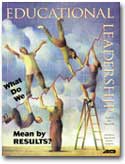In "Test Stress," education reporter Jay Mathews explores the aims, limitations, and effects of high-stakes testing.His article begins and ends with a story that might convince some readers that the current emphasis on testing has its positive side.
Darius, a 2nd grader at an inner-city school in Washington, D.C., came home with a packet of standardized-test results that showed he had received the lowest rating, below basic, in six areas of performance—from reading comprehension to math—and below average ratings in 21 of 27 content categories. Shaken, his mother, a school aide at a different elementary school, took her son gently in hand. Darius would not watch TV from 4 to 5 every evening. Instead, he would do homework or read to her, they would go slowly, and she would answer all his questions. Although Darius was reported to initially regard this as "a prison sentence," after a while he didn't mind so much.
At school, Darius's teacher devoted much class time to reading and writing. She also volunteered to give Darius 15 minutes of extra tutoring every so often at lunchtime. The work paid off. In the spring, Darius had moved up to basic in three of the six categories (all related to reading) and was deemed average in 21 content areas. He would be promoted to 3rd grade! The next topic to tackle: math. His mother knows that despite his poor scores, Darius can multiply numbers in his head. The first test, she learned, included arithmetic that he had not yet been taught.
This story reinforces many lessons dear to educators' hearts—the importance of the work ethic, the vital support of parents, the effectiveness of caring teachers. It might also suggest that the shock therapy that mandated tests have provided schools has been good for some students' education. But some questions linger.
Questions about tests. When we use standardized tests as the major criterion for judging the abilities and fates of children, are we likely in the long run to get the results we want? If the tests do not measure a given school's curriculum but instead present a blend of what has been taught across the nation, are the tests fair? If the tests change from time to time, can the scores still assess progress? Suppose that Darius were to move to Maryland or Virginia, where different tests are offered. If his scores dip, would his hard work in 2nd grade count? If his scores change at all, which school should be held accountable?
Questions about motivation. What happens to all the children whose parents are unable to help them learn and study for tests? When Darius is 12, will he be as eager to improve his test scores? At what point will students get excited about mastering a skill or learning facts that are not on the test?
Questions about learning and teaching. The knowledge explosion creates more facts from which to choose. Do the 175 items on a typical multiple-choice test limit the curriculum? Does the multiple-choice format lead to critical thinking or foster the ability to make connections? New research on learning tells us that memorizing does have its place, but engagement and delving deep are vital to retention.
Does the emphasis on testing improve teaching? In Montgomery County, Maryland, kindergartners take fewer art, music, and P.E. classes in favor of a more "rigorous" curriculum. In Texas, hundreds of high school teachers shelve their coursework during the month of January to devote all class periods to test preparation. In many classrooms, teachers find little time for project learning—from making a rocket ship to studying about ancient Egypt—work that time and again results in the best learning opportunities for students.
Questions about reform. The higher the stakes, the more temptation to abuse an arbitrary system. We read of number manipulation and cheating. Students are held back; certain students do not take the tests; others are given special help; cutoff scores are changed—all in the name of looking better on the test. No public relations campaign can gloss over the mounting cynicism about such behavior.
Questions about funding. The testing obsession costs millions of dollars. Is it the best way to spend the money? If we need tests, do we need so many? Can we use tests that sample the population but are not given to each student, or tests that measure value-added progress (see "Charting the Course of Student Growth," p. 6). Can we use teacher-made ways to help students reach high standards (see "Using Rubrics to Promote Thinking and Learning," p. 13)? As Darius knows well, the tests alone did not teach him to read.
